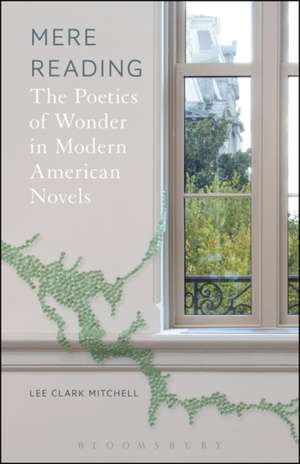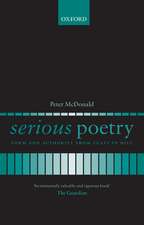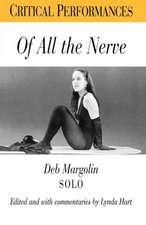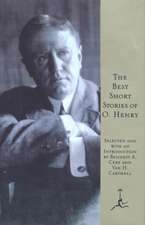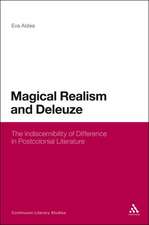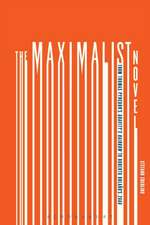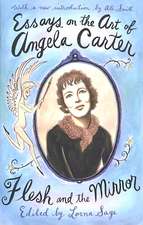Mere Reading: The Poetics of Wonder in Modern American Novels
Autor Professor Lee Clark Mitchellen Limba Engleză Paperback – 19 apr 2017
| Toate formatele și edițiile | Preț | Express |
|---|---|---|
| Paperback (1) | 191.85 lei 3-5 săpt. | |
| Bloomsbury Publishing – 19 apr 2017 | 191.85 lei 3-5 săpt. | |
| Hardback (1) | 568.40 lei 6-8 săpt. | |
| Bloomsbury Publishing – 19 apr 2017 | 568.40 lei 6-8 săpt. |
Preț: 191.85 lei
Preț vechi: 222.87 lei
-14% Nou
Puncte Express: 288
Preț estimativ în valută:
36.71€ • 38.33$ • 30.31£
36.71€ • 38.33$ • 30.31£
Carte disponibilă
Livrare economică 25 martie-08 aprilie
Preluare comenzi: 021 569.72.76
Specificații
ISBN-13: 9781501329647
ISBN-10: 1501329642
Pagini: 280
Dimensiuni: 140 x 216 x 37 mm
Greutate: 0.36 kg
Editura: Bloomsbury Publishing
Colecția Bloomsbury Academic
Locul publicării:New York, United States
ISBN-10: 1501329642
Pagini: 280
Dimensiuni: 140 x 216 x 37 mm
Greutate: 0.36 kg
Editura: Bloomsbury Publishing
Colecția Bloomsbury Academic
Locul publicării:New York, United States
Caracteristici
Leading literary critic at Princeton joins the movement to return to a more formalistic, less theoretical, less philosophical, form of literary studies
Notă biografică
Lee Clark Mitchell is Holmes Professor of Belles-Lettres at Princeton University, USA. Among his previous publications are Witnesses to a Vanishing America: The Nineteenth-Century Response (1981), Westerns: Making the Man in Fiction and Film (1996), and Determined Fictions: American Literary Naturalism (1989).
Cuprins
Introduction: Slowing Down 1. Possession in The Professor's House (1925) 2. Oscillation in Lolita (1955)3. Hospitality in Housekeeping (1980) 4. Violence in Blood Meridian (1985) 5. Language in The Road (2006) 6. Belatedness in The Brief Wondrous Life of Oscar Wao (2007)Epilogue: Resisting RulesBibliography Index
Recenzii
The strength of [Mere Reading] lies in its penetrating and poignant descriptions of important works of late modernist fiction that resist description ... Mere Reading not only persuasively argues for "slow reading," but also demonstrates the critical value of this praxis through eloquent and insightful readings of several major novels.
Mitchell's readings offer an accomplished and refreshing approach to literary works.
In a career-long recoil from an early, maternally-induced, and short-lived brush with Evelyn Woods' speed reading techniques, Lee Clark Mitchell has slackened the velocity, which is only to say tightened the grip, of his textual habits ever since-and the yield, as in two engrossing and indispensable chapters on Cormac McCarthy, is sampled here in readings that neither hydroplane across the surface of the literary page, nor approach it in programmatic slow-mo, but that let a deliberately wide variety of stylistic traction and density pace the ear of reading and test the very possibilities of attention. Unostentatiously termed 'mere' (as in 'simply') reading, the results are instead, in their deployment of seasoned gifts, an intense and exemplary case of sheer reading.
Remember how it felt to read books when you were a child? The privacy, the concentration, the wonder? At a time when, given the challenges of new media, novels are called upon to be more merely useful than ever before, Lee Mitchell argues that prose ought to be read at least as closely as poetry-every turn of syntax or figure a source of inexhaustible revelation. Not by regressing but by pushing us forward into ever more gratifyingly attentive modes of reading, Mere Reading restores us to a more truly purposeful bliss.
Mere Reading sparkles with quicksilver insights that wait around every bend of Lee Mitchell's argument. He focuses less on what readers extract from literature and more on what they experience there. He is particularly attuned to the ways in which great stylists, from Willa Cather to Cormac McCarthy, make us, in Hemingway's words, feel something more than we understand it. Mitchell continually reminds us that what we find in the best American fiction is far messier, fresher and more puzzling than most critics are willing to admit.
Mitchell's readings offer an accomplished and refreshing approach to literary works.
In a career-long recoil from an early, maternally-induced, and short-lived brush with Evelyn Woods' speed reading techniques, Lee Clark Mitchell has slackened the velocity, which is only to say tightened the grip, of his textual habits ever since-and the yield, as in two engrossing and indispensable chapters on Cormac McCarthy, is sampled here in readings that neither hydroplane across the surface of the literary page, nor approach it in programmatic slow-mo, but that let a deliberately wide variety of stylistic traction and density pace the ear of reading and test the very possibilities of attention. Unostentatiously termed 'mere' (as in 'simply') reading, the results are instead, in their deployment of seasoned gifts, an intense and exemplary case of sheer reading.
Remember how it felt to read books when you were a child? The privacy, the concentration, the wonder? At a time when, given the challenges of new media, novels are called upon to be more merely useful than ever before, Lee Mitchell argues that prose ought to be read at least as closely as poetry-every turn of syntax or figure a source of inexhaustible revelation. Not by regressing but by pushing us forward into ever more gratifyingly attentive modes of reading, Mere Reading restores us to a more truly purposeful bliss.
Mere Reading sparkles with quicksilver insights that wait around every bend of Lee Mitchell's argument. He focuses less on what readers extract from literature and more on what they experience there. He is particularly attuned to the ways in which great stylists, from Willa Cather to Cormac McCarthy, make us, in Hemingway's words, feel something more than we understand it. Mitchell continually reminds us that what we find in the best American fiction is far messier, fresher and more puzzling than most critics are willing to admit.
